
How Fast Should You Gain Weight While Bulking?
Bulking faster almost always causes faster muscle growth, but if you bulk too fast, you’ll gain more fat. Bulking slower gives you a better chance of making lean gains, but you’ll also build muscle more slowly, and you might go through periods of not building any muscle at all.
Most people split the difference, bulking at a moderate pace. I didn’t. I was desperate not to be skinny anymore, so I gained weight as quickly as I could, gaining 20 pounds in 3 months (1.5 pounds per week). That’s 3 times faster than most experts recommend, but I finished leaner than when I started.
Since then, I’ve helped over 15,000 other people bulk up at varying paces and tracked their results. Most guys who want to bulk up are thin, but I’ve also coached hundreds of skinny-fat and overweight people. It’s easy to see the patterns.
There are some interesting studies we can look at, too. In particular, the famous Ribeiro study.

The Slow vs Fast Bulking Study
The best study about how weight gain affects muscle growth and fat gain comes from Ribeiro and colleagues (study). It became famous when the top bulking researcher, Dr. Eric Helms, reviewed it in Monthly Applications in Strength Sport (MASS).
The researchers took intermediate natural bodybuilders and split them into two groups:
- The slower bulkers ate a modest calorie surplus and gained 1 pound per week on the scale. After 4 weeks, they had gained 2.6 pounds of muscle and 0.7 pounds of fat.
- The faster bulkers ate a massive calorie surplus and gained 2 pounds per week on the scale. After 4 weeks, they had gained 5.3 pounds of muscle and 4 pounds of fat.
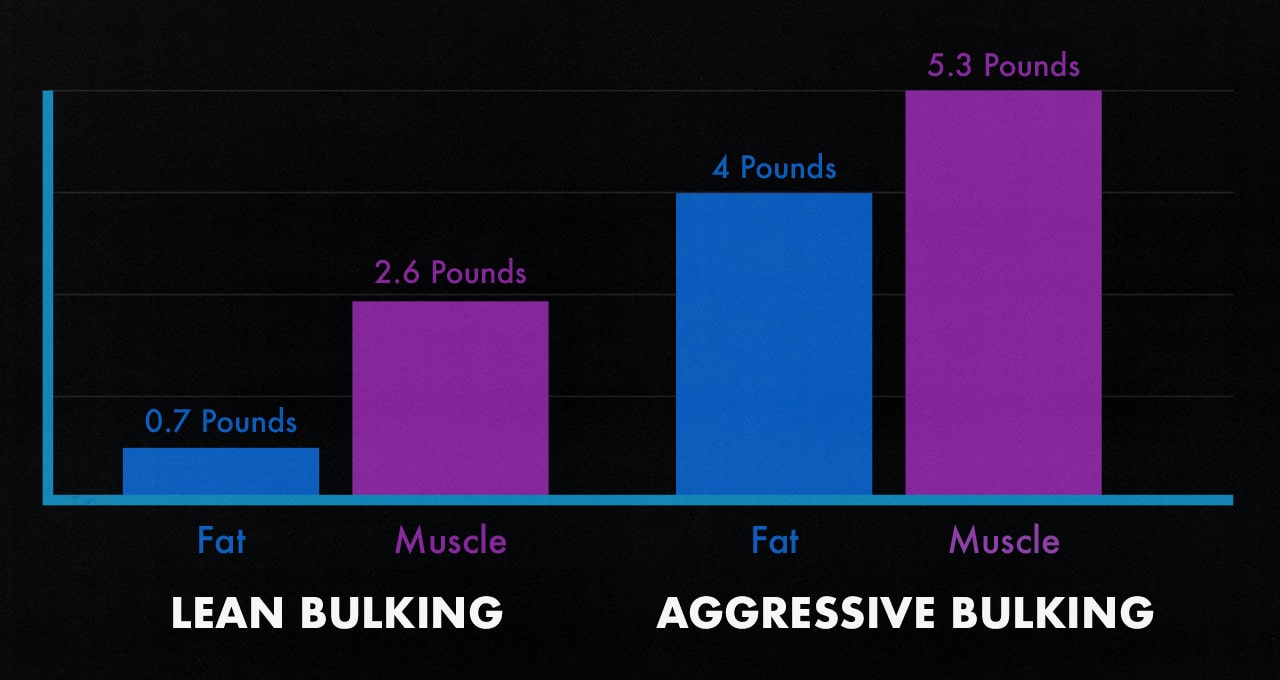
Quick note: I’m using the word “muscle,” but the researchers measured lean mass. Most of the gains in lean mass were muscle, but not all. Body fat also contains small amounts of lean mass. When you eat more food, your muscles swell up with more glycogen. They had extra food in their guts, too.
Dr. Helms used these results to argue in favour of gaining weight more slowly while bulking. You could gain twice as much muscle by bulking twice as quickly, but he doesn’t think the extra fat gain is worth it. He points out that the slower bulkers gained muscle three times as leanly:
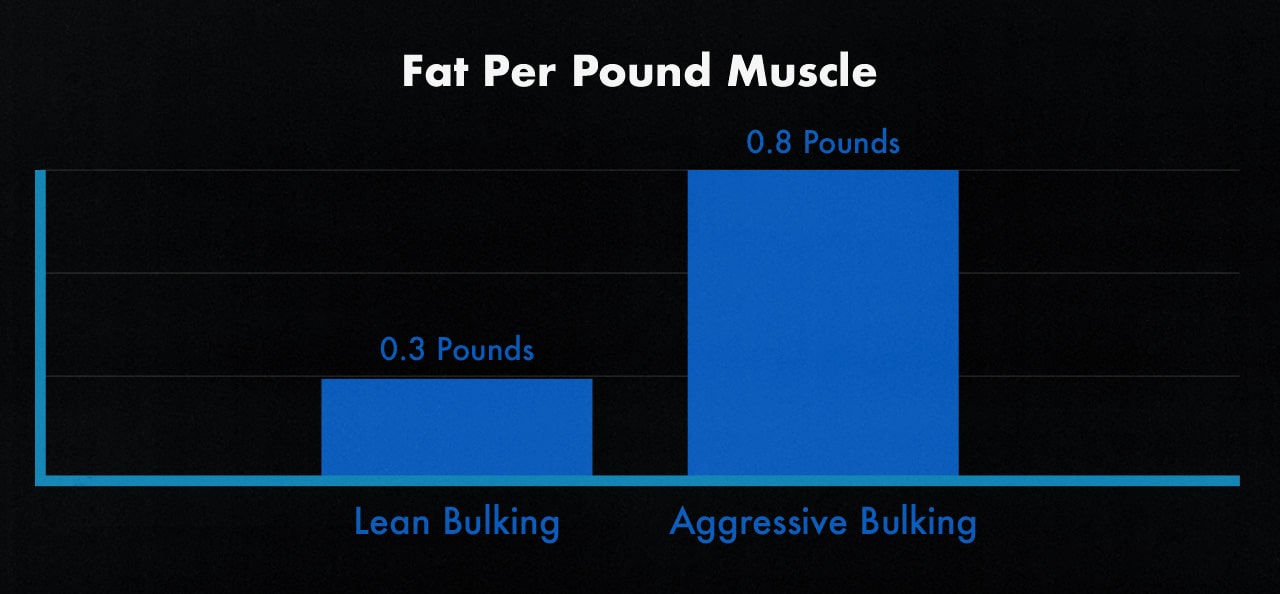
I saw the study differently. In my early twenties, I fluctuated between 120–130 pounds, with a BMI of 16. I wasn’t worried about gaining a few pounds of fat. I knew it would melt right off as soon as I stopped overeating. When I saw this study, I got excited about the possibility of gaining over a pound of muscle per week:
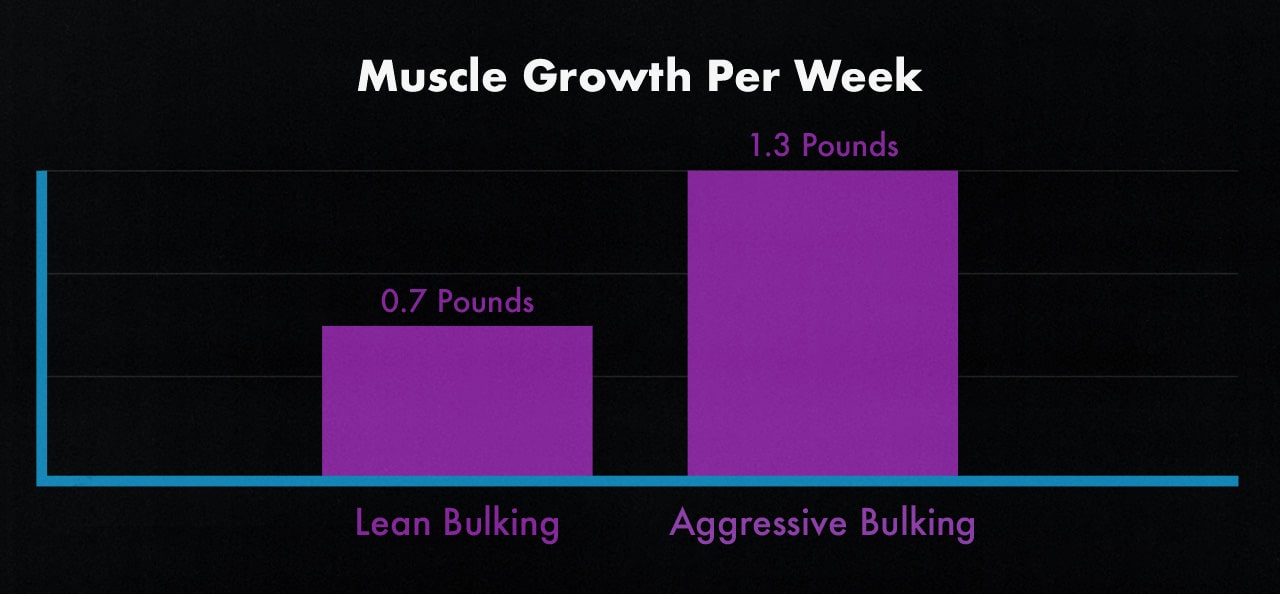
Remember, these were intermediate natural bodybuilders. They weren’t beginners making newbie gains. And they were still gaining over a pound of muscle per week.
But that’s me looking at this through the eyes of a naturally skinny guy. If you’re skinny fat and stressed about the idea of gaining fat, it’s wiser to bulk slower. In fact, you might want to bulk quite a bit slower than the slow group. More on that in a moment.
Lean Bulking vs Bulking/Cutting
That brings us to the fable of The Tortoise and the Hare, where the slow and steady tortoise wins the race because the hare takes a nap in the middle. Dr. Helms used this fable to argue in favour of the slower bulker.
Here’s the argument: if you bulk too fast and gain too much fat, you might want to take a break from bulking to burn off the fat. Meanwhile, the slower bulker can continue plodding along, slowly and steadily, spending more time in a calorie surplus—more time building muscle.
Let’s plot out the race and see who wins. First, we need a finish line. I recommend trying to gain 20 pounds of muscle per bulk. That’s usually enough to turn a skinny guy into a fit guy or a fit guy into a strong guy:
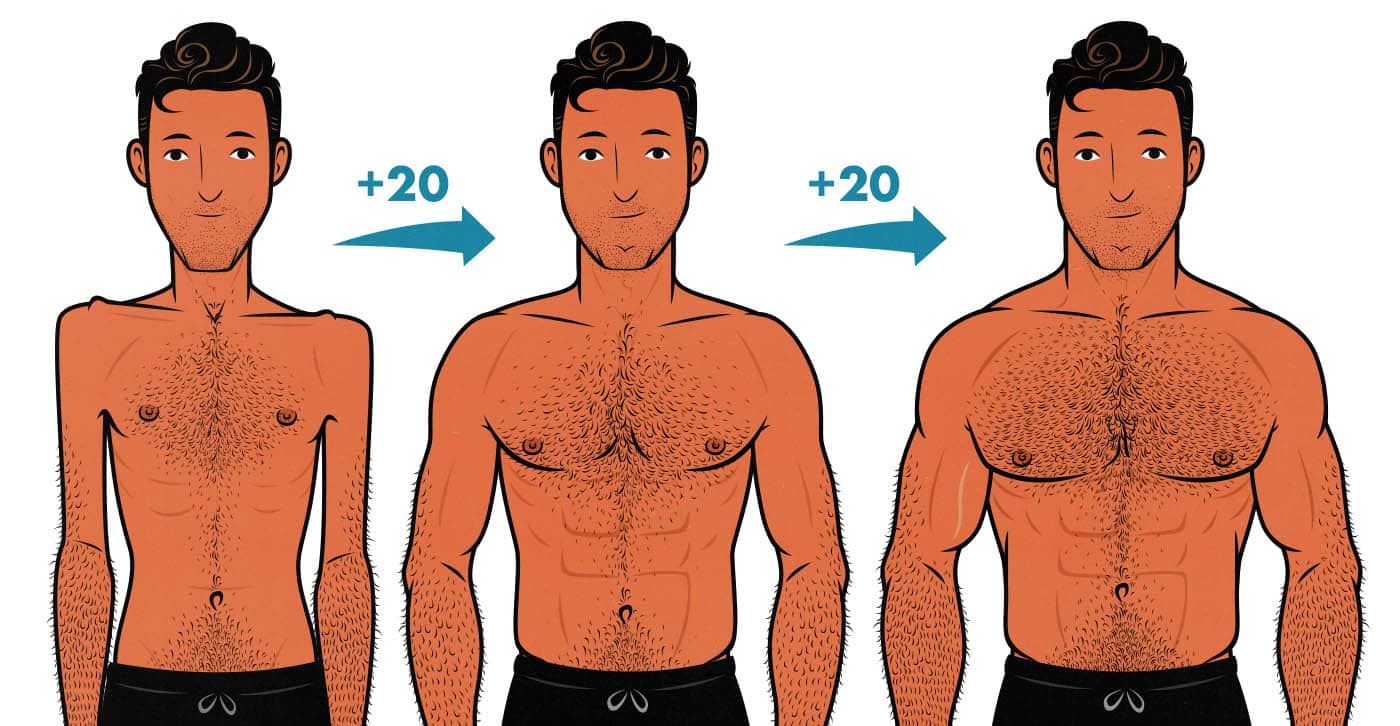
So, let’s say the Slow Bulkers and Fast Bulkers are both racing to gain 20 pounds of muscle.
- The Fast Bulkers gain 1.3 pounds of muscle every week, so it takes them 15 weeks to gain 20 pounds of muscle. But they’ve also gained 15 pounds of fat. If they decide to cut away the fat, losing a pound per week, then they’d reach their goal after 35 weeks.
- The Slow Bulkers gain 0.7 pounds of muscle per week, so it takes them 31 weeks to gain 20 pounds of muscle. But they’ve also gained 6 pounds of fat. If they lose a pound of fat per week, that brings them to 37 weeks.
The Fast Bulkers win the race, but not by a meaningful amount. If I was coaching someone, and it seemed like half the weight they were gaining was fat, I’d probably slow it down. I think it’s better to do a steadier, leaner bulk with a smaller “mini-cut” instead of a dramatic bulk and cut cycle. So, I agree with Dr. Helms, kind of.

My favourite thing about this study is the plot twist. In Dr. Helms’ famous bulking study, he recommends that more advanced lifters gain no more than 0.25% of their body weight per week. For a 180-pound lifter, that’s 0.45 pounds per week. The Slow Bulkers were gaining weight at twice that pace. Looking closer, the tortoise is just a hare in disguise.
Looking at the Larger Body of Evidence
There’s more than just this one bulking study to consider. Dr. Helms points to this older study on elite athletes. The Faster Bulkers gained about a pound per week. The Slower Bulkers gained half a pound per week. Both groups gained the same amount of muscle, but the Faster Bulkers gained far more fat.
On the other hand, we also have plenty of research showing rapid rates of muscle gain:
- Rozenek found that beginners gained 1 pound of muscle per week during their first 2 months of lifting weights.
- Tarnopolsky found that beginners gained 1.1 pounds of muscle per week during their first 2 months of lifting weights.
- Willoughby found that beginners gained 1.2 pounds of muscle per week during their first 10 weeks of lifting weights.
- Hartman found that beginners gained 1.25 pounds of muscle per week during their first 3 months of lifting weights.
In a couple of these studies, the participants lost fat while bulking quite aggressively.

The only times I recommend gaining more than a pound per week is when I think someone can do it leanly. That’s what happened to me during my first bulk. I was gaining 1.5 pounds of muscle per week without gaining a noticeable amount of fat (above). We see this with skinny clients, too:
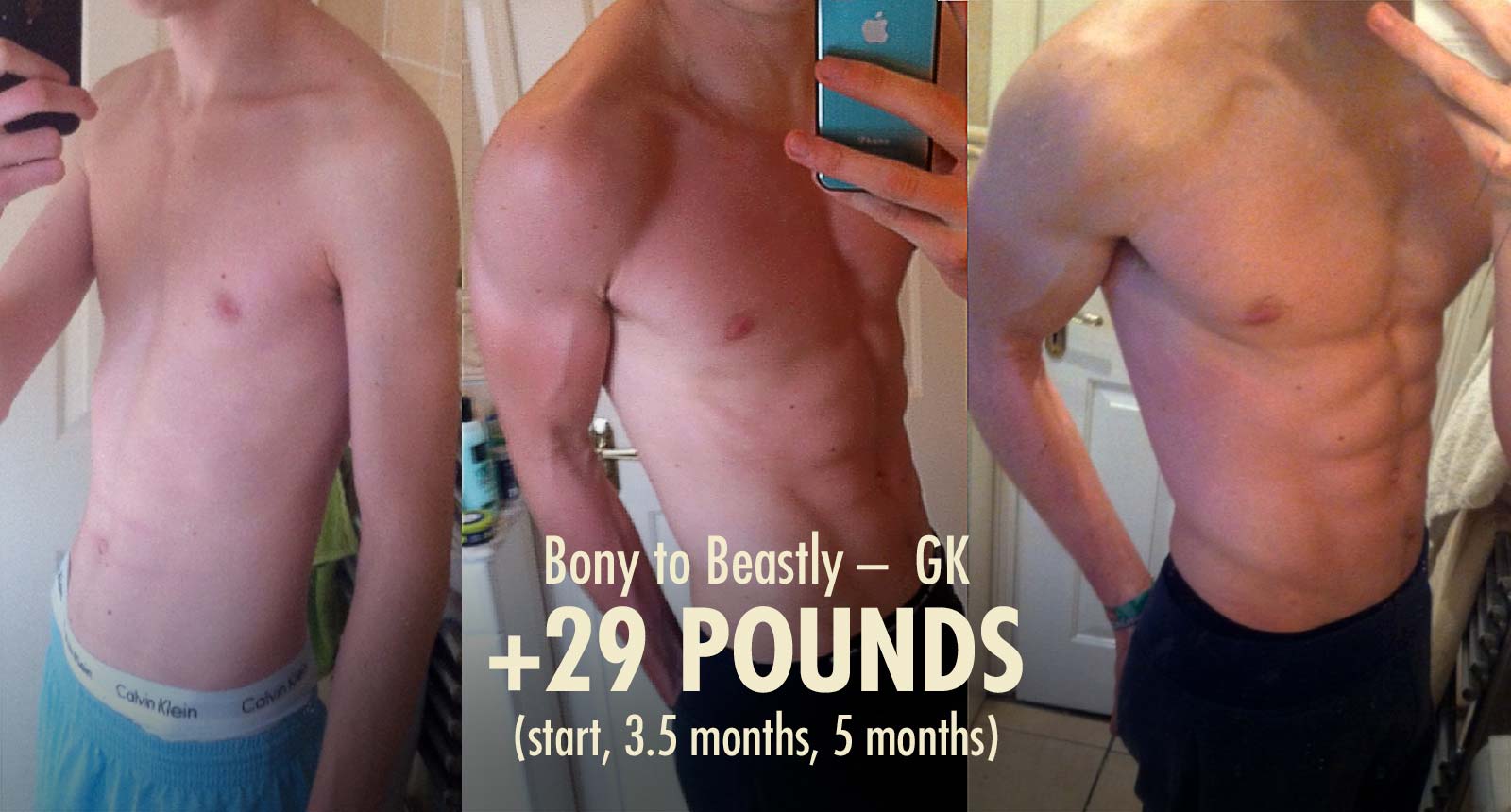
How Much Weight Should You Gain Per Week?
The is to line up your rate of weight gain with your predicted rate of muscle growth. If you think you can gain a pound of muscle per week, then you should eat enough food to gain at least a pound of weight per week. If you think you can gain less, eat less.
There’s always some guesswork involved, so you can lean into your preferences. You can err on the side of bulking faster if you’re eager to build muscle. You can bulk more slowly if you’re worried about gaining fat.
If you’re doing one of our programs, we’ll take a look at your before photos, measurements, training history, goals, and preferences, and then we’ll help you figure out how quickly to bulk. If you’re doing it by yourself, here are some guidelines:
- Aggressive bulking (1+ pounds per week): If you’re a thin, lean guy who’s new to lifting weights and following a really good bulking workout program, you might be able to benefit from gaining more than a pound per week. Track your progress, and if at any point you feel like you’re gaining too much fat, slow it down.
- Classic bulking (0.5–1 pound per week): Most guys benefit from gaining 0.5–1 pound per week. That’s a great default pace to bulk at. Again, track your progress, and if you notice that you’re gaining fat, slow it down.
- Lean bulking (≤0.5 pounds per week): If you have a history of being overweight, you hate eating in a calorie deficit, you store body fat easily, or you’re scared of gaining fat, then you could try gaining 0.5 pounds per week (or a little bit less). You could also try recomping.
*Note that creatine increases your rate of muscle growth and also draws extra fluid into your muscles, both of which cause extra weight gain during the first few weeks you use it. So, if you’ve just started supplementing with creatine, you can be a little more aggressive with your weight gain for your first month or so.
Muscle, Fitness, Health, Energy, and Aesthetics
Most Powerful Supplements Guide

Get our most powerful supplements guide with the full explanations, and steps to follow.
Plus, we’ll make sure you’re on the b2B newsletter, and send you all of our best muscle-building content.
How Quickly Should You Bulk?
The Case for Aggressive Bulking
Many skinny beginners can gain more than a pound per week without visible fat gain. If you look at our client transformations, you’ll see that plenty of guys making lean gains while gaining weight quite quickly, especially during their first 3–4 months of bulking.

The better your workout program is, and the more vigour you pour into it, the more muscle growth you’ll stimulate. The more muscle growth you stimulate, the more muscle you can build, so the faster you can gain weight without gaining fat.
I also recommend eating a great bulking diet full of nutritious, high-calorie foods. The more calories you’re eating, the more important it is to eat a good diet.
You don’t need to track your calories, but you can if you want.
The Case for a Classic Bulk
A classic bulk is the middle-ground approach. It’s what most people prefer. It’s perfect for the average lifter who’s already been lifting for a few months or years.

A classic bulk usually means aiming to gain about 0.5–1 pound per week. That usually means eating a calorie surplus of 200–400 calories, weighing yourself every week, and adjusting. If you’re gaining weight too slowly, add 200 calories. If you’re gaining weight too quickly or notice that you’re gaining fat, remove 100 calories.
You don’t need to track your calories, but you can if you want.
The Case for Lean Bulking
Lean bulking is great for guys who are getting close to their genetic muscular potential. It’s also great for people who have just finished losing weight, people who gain fat more easily, or people who don’t like the idea of gaining fat.

Lean bulks have you gaining weight quite slowly, usually less than 0.5 pounds per week. That means you’ll need to eat in a very small calorie surplus, which doesn’t leave you with much of a margin for error. You’ll probably need to track your calories. Here’s the calorie-tracking app we recommend.
The Case for Recomping
If you’re overweight or skinny fat, you might not need to bulk at all—at least not at first. If you have enough extra fat, your body will happily use that energy to build muscle. You might do better by starting with a recomp.
Will Bulking Too Fast Make You Fat?
The worry most guys have is that bulking fast will make them fat. There’s a bit of a misconception here. There’s a difference between gaining fatter and getting fat.
You aren’t fat if you start bulking at 10% body fat and finish at 15%. You’re still well within the healthiest and most attractive body-fat percentage range. You may even look better at 15% body fat. Your neck and face will look fuller, and you’ll look buffer in clothes.
Gaining a few pounds of fat won’t make you fat. Your body fat percentage will go up by a couple of points, but most people won’t even notice the difference. You might not even notice the difference. That’s why it’s important to track your progress. It helps to notice sooner rather than later. That way, you can stop gaining fat before you get fat.
In our bulking program, we’ll monitor your progress and give you feedback. We’ll help you figure out how quickly to gain weight, when to slow it down, when to bulk, and if you ought to cut.

Alright, that’s it for now. If you want a full workout and diet program, including a 5-month customizable full-body workout routine, a diet guide, a recipe book, and online coaching, check out our Bony to Beastly Program. Or, if you want a customizable intermediate muscle-building program, check out our Outlift Program.

